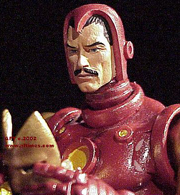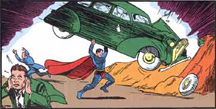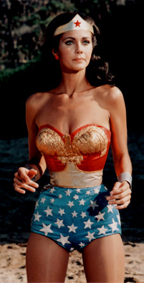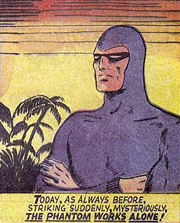King Arthur, Iron Man, and Brooks Brothers, by Dennis O’Neil
 To…oh, say, King Arthur, if he ever existed, you would have superpowers. I mean, look at you. You can travel 100 miles an hour (but that red light flashing in your rearview mirror can’t be good) and you can cause a blank pane of glass to light up and show you what’s happening on he other side of the world, or what happened last week, or both, and you can twist your wrist and cause flame to appear atop that table-thing in the kitchen, with no protracted fussing with flint and stone… To Arthur, it would appear that you’re employing magic.
To…oh, say, King Arthur, if he ever existed, you would have superpowers. I mean, look at you. You can travel 100 miles an hour (but that red light flashing in your rearview mirror can’t be good) and you can cause a blank pane of glass to light up and show you what’s happening on he other side of the world, or what happened last week, or both, and you can twist your wrist and cause flame to appear atop that table-thing in the kitchen, with no protracted fussing with flint and stone… To Arthur, it would appear that you’re employing magic.
Living when he did, Art never read another Arthur’s observation that any form of technology sufficiently advanced would appear to be magic, at least to lumps like us. (I refer to Arthur C. Clarke, but you knew that…) So Arthur, (the king, not the science fiction writer) might watch you doing your stuff and conclude that you must be magic and because you’re magic you must be special. He wouldn’t know that you bought your powers, at a discount, at that big, ugly mall about a mile west on the freeway.
Remember, he had a special sword, Excalibur, and he had it because he deserved to have it. And so it was with other talismans, amulets, and assorted weapons and mystic hoo-haws that super good guys got hold of during their adventures down through the ages.
Which brings us to Tony Stark.


 So you wanna be a superhero. Okay, where are your powers going to come from?
So you wanna be a superhero. Okay, where are your powers going to come from? Before we get to this week’s official topic, a continuation of our discussion of how superheroes have been evolving, I’d like to remind you all that ontogeny recapitulates phylogeny. I’m sure all you fans of the late 19th century biologist Ernst Haeckel – and I know you’re legion – remember that this means that the development of an organism exactly mirrors the evolutionary development of the species.
Before we get to this week’s official topic, a continuation of our discussion of how superheroes have been evolving, I’d like to remind you all that ontogeny recapitulates phylogeny. I’m sure all you fans of the late 19th century biologist Ernst Haeckel – and I know you’re legion – remember that this means that the development of an organism exactly mirrors the evolutionary development of the species. Boo.
Boo. Warner Bros. inked a deal with Greg Berlanti to direct its live-action Green Lantern movie, based of course on the DC Comics character. Known primarily for his writing and executive producing TV credits (e.g. Everwood, Dawson’s Creek, Jack & Bobby, Brothers & Sisters), Berlanti will pen the script for the movie with Brothers & Sisters writer/producer, Marc Guggenheim and Heroes co-executive producer Michael Green.
Warner Bros. inked a deal with Greg Berlanti to direct its live-action Green Lantern movie, based of course on the DC Comics character. Known primarily for his writing and executive producing TV credits (e.g. Everwood, Dawson’s Creek, Jack & Bobby, Brothers & Sisters), Berlanti will pen the script for the movie with Brothers & Sisters writer/producer, Marc Guggenheim and Heroes co-executive producer Michael Green.  The last time I’ve spoke to Jackie Chan he said to me: “I’ve done everything three times” – meaning that he’s finding less and less ways, and reasons, to top himself. Unfortunately that also results in schizo, ultimately unsatisfying, films, further hampered by his unwillingness to mature his screen persona. Even so, he keeps looking for ways to challenge himself and keep busy, despite the repetition of his movie and charity work.
The last time I’ve spoke to Jackie Chan he said to me: “I’ve done everything three times” – meaning that he’s finding less and less ways, and reasons, to top himself. Unfortunately that also results in schizo, ultimately unsatisfying, films, further hampered by his unwillingness to mature his screen persona. Even so, he keeps looking for ways to challenge himself and keep busy, despite the repetition of his movie and charity work.  There may be some practical reasons why the grown-for-television superheroes dress in plain clothes rather than the colorful garb of their comic book and movie counterparts.
There may be some practical reasons why the grown-for-television superheroes dress in plain clothes rather than the colorful garb of their comic book and movie counterparts. My beloved has just been pushed out of a fourteenth story window and is plummeting toward certain doom. I must rescue her and I will – as soon as I change clothes…
My beloved has just been pushed out of a fourteenth story window and is plummeting toward certain doom. I must rescue her and I will – as soon as I change clothes… What does one hum on the way to the comic book store? If you’re a person of a certain age, with a certain history with certain illegal substances, you probably have a few songs about the original super-hero stuck in the part of your brain that should be storing French vocabulary words.
What does one hum on the way to the comic book store? If you’re a person of a certain age, with a certain history with certain illegal substances, you probably have a few songs about the original super-hero stuck in the part of your brain that should be storing French vocabulary words.  Obits – obituaries – are tough things to write. Their purpose is to commemorate the life of someone recently deceased, to list their accomplishments and achievements, to take note that someone has passed out of our lives. A last fanfare to the life of someone who is gone. Generally speaking, they are valedictory and complimentary.
Obits – obituaries – are tough things to write. Their purpose is to commemorate the life of someone recently deceased, to list their accomplishments and achievements, to take note that someone has passed out of our lives. A last fanfare to the life of someone who is gone. Generally speaking, they are valedictory and complimentary.








